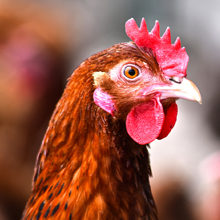New vaccine developed for infectious laryngotracheitis
31 August 2018

A new vaccine has been developed for an important chicken disease. Infectious laryngotracheitis (ILT) is caused by virus that targets the respiratory system of chickens. Infected chickens have reduced egg-production, weight loss and in severe cases, ILT is fatal.
Currently, the vaccine for ILT is a live attenuated vaccine. This means that, although it is effective, in some cases the virus particles in the vaccine mutate and can cause disease.
Researchers at the University of Zurich have developed a new virus that does not pose this risk. Instead of using a weakened virus, the vaccine uses virus-like particles that the immune system can recognise but won’t cause disease.
Dr Nina Wolfrum, who is part of the research group that developed the virus, then tested how effective the vaccine at producing an immune response. At the doses used, the found the new vaccine produced no obvious side effects.
The research also showed that this new vaccine does produce an immune response against ILT infection, although further research is needed. In the future, the vaccine could be useful in preventing ILT in poultry flocks, improving animal welfare and reducing economic losses.
Dr Wolfrum will discuss her findings at the Microbiology Society’s Focused Meeting: Molecular Biology and Pathogenesis of Avian Viruses.
Her talk, Evaluation of a new VPD-based vaccine against infectious laryngotracheitis (VLT) will take place at 16:10 on 4 September, at St Catherine’s College, University of Oxford.
This story was edited on September 10, 2018
